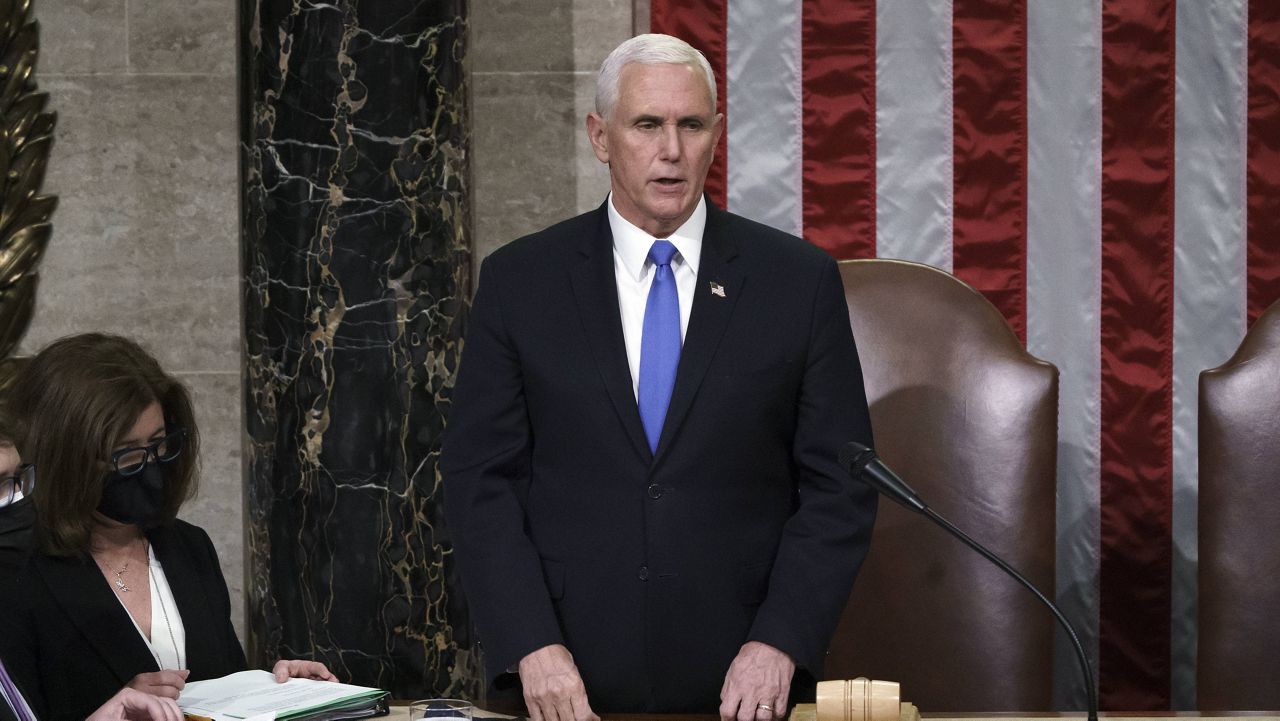A bipartisan group of Senators on Wednesday unveiled a pair of bills that would reform and overhaul the way that elections are administered, including clearly defining the role of the vice president in certifying the election – the most significant effort at comprehensive reform since the contentious 2020 election.
The group of nine Republicans and seven Democrats unveiled their proposal for the Electoral Count Reform and Presidential Transition Improvement Act, which contains two bills — the Electoral Count Reform Act, which would clarify ambiguous language in the Electoral Count Act of 1887, and the Presidential Transition Improvement Act, which seeks to promote the orderly transfer of power — after months of negotiations in the wake of the Jan. 6 attack on the U.S. Capitol.
The announcement comes one day before the House Select Committee investigating the Jan. 6 insurrection is set to hold its second primetime hearing, which is set to focus on former President Donald Trump’s actions that day as a mob of his supporters stormed the Capitol to disrupt the electoral tally.
Trump and his allies sought to exploit loopholes in the Electoral Count Act of 1887 to overturn the results of the 2020 election in an attempt to keep the Republican in power despite his loss to Democrat Joe Biden.
The bipartisan efforts were spearheaded by moderate Sens. Joe Manchin, D-W.Va., and Susan Collins, R-Maine, and included Sens. Rob Portman, R-Ohio, Kyrsten Sinema, D-Ariz., Mitt Romney, R-Utah, Jeanne Shaheen, D-N.H., Lisa Murkowski, R-Alaska, Mark Warner, D-Va., Thom Tillis, R-N.C., Chris Murphy, D-Conn., Shelley Moore Capito, R-W.Va., Ben Cardin, D-Md., Todd Young, R-Ind., Chris Coons, D-Del., Ben Sasse, R-Neb., and Lindsey Graham, R-S.C.
“From the beginning, our bipartisan group has shared a vision of drafting legislation to fix the flaws of the archaic and ambiguous Electoral Count Act of 1887,” the lawmakers said in a statement. “Through numerous meetings and debates among our colleagues as well as conversations with a wide variety of election experts and legal scholars, we have developed legislation that establishes clear guidelines for our system of certifying and counting electoral votes for President and Vice President.”
“We urge our colleagues in both parties to support these simple, commonsense reforms,” they added.
The Electoral Count Reform Act would, importantly, clarify that the role of the vice president in the electoral count is “solely ministerial” and clarifies that they don’t “have any power to solely determine, accept, reject, or otherwise adjudicate disputes over electors.”
The bill would also dramatically raise the threshold for the number of members of Congress needed to object to a state’s election results — to at least one-fifth of members of both the House and Senate — in order to “reduce the likelihood of frivolous objections by ensuring that objections are broadly supported.” Currently, it just takes one member of each chamber to object to a state’s slate of electors.
The measure would also specify that a state can only appoint one slate of electors that must be submitted by the state’s governor, or another official specified in the state’s laws or constitution. It would also provide for expedited judicial review process for raising questions for a state’s elections and protects each state’s popular vote by striking down a provision of an 1845 law that could allow state legislatures to declare a “failed election” and override the vote.
The Presidential Transition Improvement Act would clarify when presidential candidates can obtain transition resources when an election is contested.
With nine Republican backers on the Electoral Count Reform and Presidential Transition Improvement Act, the measure would need the support of just one more Republican to surpass the Senate’s 60-vote legislative filibuster threshold.
The other measure, the Enhanced Election Security and Protection Act, is co-sponsored by five Republicans and seven Democrats, including Collins, Manchin, Tillis, Sinema, Murkowski and Romney.
The bill would double the legal penalty for those who threaten or intimidate election officials, poll watchers, voters or candidates and improve the handling of election mail by the U.S. Postal Service, increase penalties for those who tamper with election records and make it illegal to tamper with voting systems. It would also reauthorize the Election Assistance Commission (EAC), the independent agency that helps states improve election administration and security, for 5 years and mandate that it "conduct cyber security testing as part of its testing and certification process for voting systems."
The bipartisan group consulted with Senate Rules Committee Chair Amy Klobuchar, D-Minn., and Ranking Member Roy Blunt, R-Mo.
"We must update the antiquated Electoral Count Act to ensure that electoral votes for president accurately reflect the election results in each state and to improve the process for counting electoral votes in Congress,” Klobuchar said in a statement. "I appreciate the hard work of the working group to achieve bipartisan consensus on this draft legislation. I look forward to continuing to work with the group and Ranking Member Blunt to pass a bill that brings needed changes to our presidential elections."
"This is a good bill - specifically the provisions clarifying the Vice President’s limited role and increasing the threshold for objections," said Sen. Sasse, one of the members of the bipartisan group. "This bill cleans up some ambiguity in the ECA that was dishonestly exploited on Jan. 6."
"Susan [Collins] and Joe [Manchin] have worked hard to tackle this issue," Sasse continued. "Let’s get this done."
Spectrum News' Austin Landis contributed to this report.



